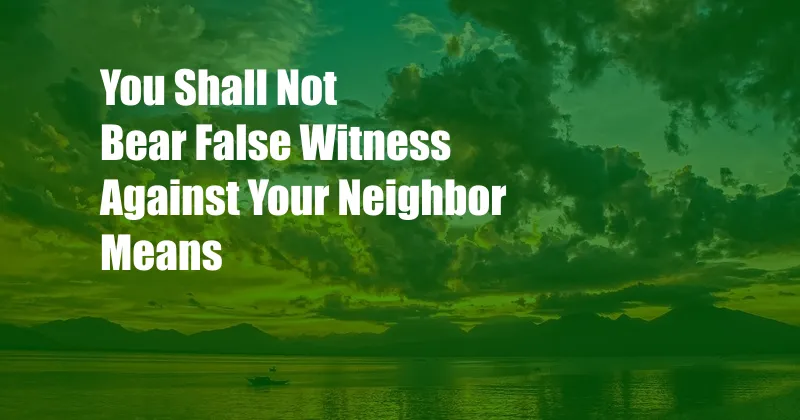
**Thou Shalt Not Bear False Witness Against Your Neighbor: Uncovering the True Meaning**
In a world often clouded by deception and hearsay, the commandment “Thou shalt not bear false witness against your neighbor” stands as a beacon of truth and integrity. This ancient law, etched into the very fabric of our moral compass, reminds us of the paramount importance of honesty and the dire consequences of falsehood.
The concept of “false witness” encompasses not only blatant lies but also subtle distortions of truth, malicious intent, and the spreading of rumors. When we engage in such actions, we not only inflict harm on the reputation and well-being of our neighbors but also erode the very foundations of trust and unity within our communities.
**The Impact of False Witness**
The ramifications of false witness are far-reaching and severe. It can result in:
- Damaged Relationships: Falsehoods strain and break relationships, sowing seeds of mistrust and resentment.
- Unfair Judgments: In legal and other contexts, false witness can skew the truth, lead to wrongful punishments, and hinder justice.
- Social Isolation: Communities thrive on honesty and integrity. Those who spread falsehoods and rumors can find themselves isolated and ostracized.
**Historical and Biblical Context**
The commandment “Thou shalt not bear false witness” first appears in the Ten Commandments, a set of moral and ethical laws given to the Israelites by God through Moses. In ancient Israel, false witness was considered a grave sin, as it could have serious consequences for both the accuser and the accused.
Throughout history, the concept of false witness has been recognized and condemned by various cultures and religions. In many legal systems, perjury (the act of lying under oath) is considered a serious crime. Moreover, various religious texts, including the Bible, Quran, and Torah, emphasize the importance of truthfulness and the consequences of bearing false witness.
**Modern Applications**
In today’s digital age, where information spreads at an unprecedented pace, the commandment “Thou shalt not bear false witness” remains relevant and vital. Social media platforms and online forums can provide fertile ground for the dissemination of false information, rumors, and character assassination.
It is crucial that we remain vigilant in the face of potential falsehoods, carefully evaluating the sources of information and seeking out multiple perspectives before accepting something as truth. Moreover, the proliferation of fake news and “alternative facts” demands that we cultivate a healthy skepticism and a commitment to truth-seeking.
**Tips and Expert Advice**
To avoid bearing false witness, experts recommend the following:
- Verify Information: Always confirm the accuracy of information before passing it on to others.
- Be Honest and Transparent: Maintain a reputation for truthfulness, even in difficult situations.
- Resist Gossip and Rumors: Avoid spreading unsubstantiated claims or participating in conversations that disparage others.
- Question Your Biases: Be aware of your own biases and seek to understand different perspectives.
- Apologize if Wrong: If you realize you have spread false information, apologize and correct the record promptly.
By adhering to these principles, we can help create a society where truth and integrity prevail. Remember, the consequences of false witness can be severe, not only for the victims but also for our own souls and the well-being of our communities.
**Frequently Asked Questions (FAQs)**
Q: What is the difference between a lie and false witness?
A: A lie is any statement that is known to be false, regardless of the intent. False witness specifically refers to lying under oath or in a legal proceeding.
Q: Why is it important to avoid bearing false witness?
A: False witness can harm individuals, damage relationships, obstruct justice, and erode trust within communities.
Q: What can I do if I am the victim of false witness?
A: If you believe you have been falsely accused, you should seek legal advice and consider taking appropriate action to protect your reputation.
**Conclusion**
“Thou shalt not bear false witness against your neighbor” is a commandment that stands the test of time, reminding us of the importance of honesty, integrity, and truth-seeking. By adhering to this principle, we can create a society where trust, justice, and harmony prevail. The choice is ours: to embrace the truth or to succumb to the corrosive power of falsehood.
Are you interested in learning more about the far-reaching consequences of bearing false witness? Share your thoughts or questions below.